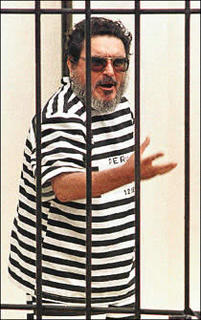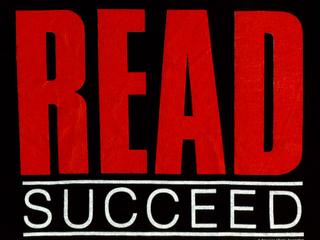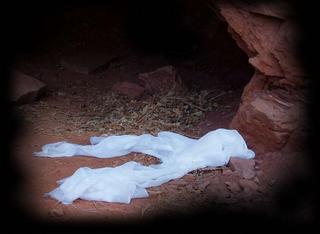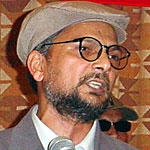
The seven dwarfs have come up with the following:
1. No extremism - follow democratic path
2. An end of the autocratic rule of the king –the need of the day
3. Reinstatement of the house of representatives for the rule by the people’s representatives
4. Some main agenda for resolving national crisis
a. Formation of all party government answerable to the parliament
b. Management of violent conflict and establishment of sustaining peace
c. Commitment to progressive and forwarding moving programs
d. Fixing of constitutional questions
5. The constitution of the kingdom of Nepal 1990 as the basis of progressing ahead
6. National election schedule
(Source: Forum Asia)
This could lead to a restoration of the funamental rights of the people, which would be great, but this is no formula for lasting peace in the country. The number 3, reinstating the House of Representatives, is problematic. The parties need to make clear as to who will do it. I think it is implicit the king is supposed to. So your entire strategy rests on a possible act by the king. And if that be the case, the parties need to suggest as to what article and sub-article in the 1990 constitution the king may lawfully use to perform the act. Is it Article 127? Article 36? Some other article? What article will the king invoke to suggest reviving parliament is a constitutional act? Or is he to keep stretching Article 127 beyond recognition, as he has shown the propensity to do?
Point number 5 is the most problematic. The Pahadi Bahuns are nowhere close to seeing the 1990 constitution has to go. That is the only way out of the impasse. As a Madhesi, my pesonal disgust with the 1990 document is total.
The social regressives of the Congress and the UML seem to have bullied their smaller partners into signing into this document.
The 1990 constitution can not be merely tinkered with. It has to go. Something new has to come up.
These Bahuns think they are going to (1) get people out in the streets, (2) pressure the king into using his divine powers to resurrent the term-expired House, (3) talk the Maoists into working within the 1990 constitution by adding a few sweeteners, a few programs here and there, perhaps a Nepali version of the Jawahar Rojgar Yojana they have in India.
These are three big Ifs, progressively harder. I think (3) is impossible. And if that not be an option, the rest do not matter.
- THE NEW YORK TIMES (NYT) ON PERU ..... the insurgency is making a comeback ..... the military offensives of the People's Army of Liberation, which have continued unabated after the capture of President Gonzalo...... why have states of emergency and military curfews continued in most of the country since the capture of President Gonzalo in 1992? Why do the masked judges continue to exist? Why have psychological operations like the endless "capture of terrorists" publicized by the regime been intensified from 1992 to the present? ....... "Experts on terrorism said that the attacks were the most successful the Shining Path has undertaken since its top leaders were captured three years ago. The arrests were considered a turning point in a civil war that has killed more than 35,000 people and cost $25 billion in damages since 1980"...... The PCP has never had a single individual as leader, nor has it ever functioned on the will of any individual; therefore the capture of President Gonzalo may have temporarily disrupted the leadership, but it did not mean at all that the Party was "crippled" much less "decapitated." President Gonzalo himself described his capture simply as a "bend in the road."....... the SIN/CIA disinformation campaign as part of their psychological warfare...... 558 arrests every day as an average! ..... Shining Path guerrillas also attacked a construction company in the highlands, destroying equipment and property....... the destruction of imperialist equipment and property used to exploit the workers and plunder the resources of the country is a legitimate action of the revolution...... There is only one leadership of the Peruvian revolution: The PCP Central Committee. The "split" of the Party exists only in the obsessed mind of the imperialists....... Many of those expelled from the Party in the 70s and just before the initiation of the People's War, later participated in the elections for the Constitutional Assembly under military dictator Morales Bermudez, or have fled the country......
- Peru Fears Reemergence of Violent Rebels .....the stirrings of a dormant guerrilla
organization ..... a spike in drug cultivation in these eastern forests and a surge in guerrilla activity...... the movement, which had declined rapidly after the arrest almost a decade ago of its ideological founder, Abimael Guzman, was resurfacing as a threat..... the Shining Path is regrouping with far stronger ties than in the past to the drug trade, particularly the lucrative commerce in opium poppies..... Gonzalo, was arrested two years after then-President Alberto Fujimori took office on a pledge to end the movement. Guzman said Peru's social order had to be destroyed to make way for a new one, a plan that called for killing 10 percent of the civilian population...... The investigation had safe houses and senior leaders under surveillance..... difficult to determine whether the Shining Path is resurfacing as an ideological movement or a drug gang working for Colombian sponsors, who supply the cash, seeds and technological know-how...... Numbering roughly 600 soldiers, the movement has lost its ideological leadership, and only two commanders have anything approaching national name recognition...... Last year, 70 percent of the heroin seized on the U.S. eastern seaboard came from Latin America, the vast majority from Peru and Colombia..... narco-traffickers and the Shining Path. Here they are the same - Sendero File - Capture of Abimael Guzman - October 1992 / gci 275 .....an elite unit of the National Directorate Against Terrorism (DINCOTE) raided a residence in the middle-class neighborhood of Surco, suspecting that the residence operating as a dance studio was really a SL safehouse. On the second floor, policemen found a bearded, casually dressed man with a distinct air of a university professor. It was Abimael Guzmán, 57, Sendero's supreme leader and the most wanted man in Peru for more than a decade....... DINCOTE units also fell on two other safehouses, arresting 30 more people. The raids obtained a cache of documents, notes and computer disks. In the following days, police units swept up the national coordinator responsible for liaisons with the regional committees and the coordinator of the northern Lima zone........ To guarantee the secrecy of the operation, not even President Fujimori was notified. Credit was due to DINCOTE, the most consistently effective counter- terrorist unit and its commander, General Antonio Vidal...... a sterling example of nuts-and-bolts intelligence and surveillance work, police professionalism, and respect for human rights ...... "The psychological bubble was burst" ..... From 1 a.m. to 6 a.m., almost daily operations employing more than 1,000 army and police troops combed SL hotbeds in Lima's shantytowns, like Huaycán and Pachacamac (a new section of Villa El Salvador), though most arrests were of people not carrying identification documents. During the late morning hours, security forces carried out civic action programs, providing breakfasts, primary health care and even haircuts. Shantytown residents also used the police presence to reap a dividend for neighborhood safety by turning in thugs and drug addicts. There were also reports of residents identifying local SL cadres...... The government has also tried to exploit the psychological blow by portraying Guzmán as a crazed psychopath and common criminal.......those SL rank and file who turn themselves in will get lenient treatment, including a period of special military service and then a return to civilian life...... Guzmán is being represented by Alfredo Crespo, a lawyer belonging to the Asociación de Abogados Democráticos (Democratic Lawyers Association - AAD), a SL front organization. Crespo said that Guzmán considers himself a "prisoner of war."...... Currently, about 42 percent of national territory and 47 percent of Peru's 22.6 million inhabitants are under emergency military control....... Guzmán's capture is a huge setback for SL and comes when the organization was planning an unprecedented offensive to demonstrate the government's vulnerability. Guzmán himself has been laying the groundwork over the past eight years for SL to make a dramatic leap in striking power that was to be revealed in full in October this year....... For nearly 30 years, Guzmán has been the founder, ideologue and supreme strategist of Sendero Luminoso....... the instigator of a personality cult and the arbitrator of internal disputes, playing a role which no other party member could fill...... The capture compromises Sendero's whole organization from the top down..... SL ideology is a compact, coherent piece of circular logic which can appeal in a fragmented, dysfunctional society...... ideological message is packaged in easily digestible capsules...... the party, with its People's Guerrilla Army and satellite organizations, into a nationwide network with a decentralized command structure, tactical initiative and defined objectives...... demonstrate what the party claims as "strategic parity" against government forces. ... fighting force range from 5,000 to 10,000. SL retains its military apparatus intact and operative... as many as 50,000 militants provide logistical support..... a broad, multi-faceted and multifront strategy strikingly matched with an organization to carry it out..... In a country where few organizations work efficiently, Sendero does...... lines of action: propaganda; recruitment and training; education; infiltration, neutralization and seizure of competing organizations; logistical support and communication for its clandestine network, its operating units and its command structure; intelligence gathering and processing; and strategic planning at a national, regional and local level....... Guzmán oversaw a Senderista penetration in urban areas, a risky transition for any guerrilla movement, but a prerequisite for taking power..... engaged in urban activities which were unimaginable five years ago...... as the organization has grown and diversified, Guzmán was becoming more of a chairman of the board than a hands-on field general, and had to rely on competent subordinates with tactical autonomy and command authority..... The intelligence haul at the safehouses and any additional information that can be obtained from those captured is of a transitory nature, tactically speaking, but will have great usefulness in piecing together an understanding of how SL functioned...... Perhaps, as much as 70 percent of the national territory lies outside the permanent reach of the State...... The underlying causes of the insurgency and the setting of social and political decay have not changed with Guzmán's capture. The historical motherlode of ethnic and class hatred is still there to be mined. The economic recession is still grinding up scores of companies and spewing out massive unemployment. Narco- trafficking and corruption are undermining institutions already weakened by the impact of 15 years of crisis. The government has failed to provide minimum public services, especially in the areas of health, education and justice. The political system is fragmented and in upheaval, facing a crisis which predates the April 5 coup and will continue for the foreseeable future....... For an organization which has planned each step to the last detail, it is unimaginable that it has not planned for the possibility of Guzmán's capture....... the "shield of fear" which protects its cadres from being fingered...hostage taking, car bombs, massive sabotage or a spectacular attack........ the time line for revolution. Guzmán himself has already told the party to proceed with current plans...... Guzmán never designated a successor...... regional and military commands have, for the most part, been unscathed....... the Huallaga command which controls the party's purse strings; and the Lima metropolitan committee which will have to take the blame for Guzmán's capture....... Over the years, Guzmán has overseen internal tensions, instigated debates and channeled the friction into almost ritualistic purges of the upper tiers of the party, without permitting the organization to spin out of control...... Maoist guerrilla groups have generally fizzled after the loss of their founder, but fundamentalist movements, with which Sendero has strong similarities, have weathered the transition better...... Sendero's appeal has been its rigid ideological stance and dogmatic refusal to enter into political alliances....... Fujimori has skillfully shifted public debate to a `with me or with Sendero' polarity and there is precious little habitable middle ground for more sophisticated discussion .... there are still congressional sanctions attributable to the Fujimori coup...... it was premature to call Guzmán's capture a deathblow. "In this kind of war you can only measure substantial progress by the number of people and amount of territory that has been brought back to a viable democratic life."..... an internationally acceptable counterinsurgency campaign....... Sendero has begun political work in Ecuador, opening up a second international corridor to back up its toehold in Bolivia...... SL, however, failed repeatedly to gain a foothold in the lowland communities and urban areas of Piura..... On the Ecuador side of the border, SL has set up reception bases for incoming cadres to support them in changing identities, planning and travel...... In Bolivia, the collaboration between Sendero and the Tupac Katari movement has led Tupac Katari rank and file to shift their loyalties directly to SL, leaving the Bolivian leaders stranded...... provincial correspondents tend to misinform about, misinterpret or even invent incidents to fill their news quotas..... as SL grew and the military widened its area of authority, large sections of the country were no longer open for independent journalists to investigate........ the military institution has largely designed and implemented counterinsurgency strategy, leaving civilian policy makers aside in the decision-making process. What is more important, military officials have remained largely unaccountable for their decisions due to the lack of any civilian oversight capacity or alternative strategies....... Sendero's appeal to women and why they play leading roles in the organization..... the teacher who taught us open and secret work...... Guzmán went to China during the Cultural Revolution and met many of the battle-hardened cadres who fought against Japan and the Kuomintang. From their pragmatic lessons and from reading Mao's writings, he acquired the foundations of military thinking...... another influence on Guzmán, Sun Tzu and his monumental text The Art of War ..... Mao frequently paraphrased Sun Tzu in his writing and his instructions to his subordinates...... spent two decades studying the military tactics and strategies used in the Andes for four centuries...... SL's practices, its reliance on intelligence gathering, assessing the enemy's strengths and weaknesses, studying and choosing adequate terrain and climate and exploiting the unexpected and deception..... Sun Tzu: "Thus, those skilled in war subdue the enemy's army without battle. They capture his cities without assaulting them and overthrow his state without protracted operations."
- 'Superman' Meets Shining Path: Story of a CIA Success At 8:45 p.m. on Sept. 12, 1992, a special Peruvian police undercover unit captured Abimael Guzman, leader of the fanatical Maoist guerrilla group known as Shining Path, in his hideout on a quiet, middle-class street in Lima...... an astonishing achievement for Peru's police. "Superman" helped too..... "Superman" was the cops' nickname for a tall, dark-haired American who, they thought, resembled actor Christopher Reeve, and who served as their main contact in the Central Intelligence Agency..... When the cops needed cars, the CIA paid for them; when they found a Shining Path document in English, Superman translated...... the U.S. government found out before Peru's then-president, Alberto Fujimori, or his intelligence chief, Vladimiro Montesinos, did....... Helping catch Guzman, these sources concurred, was a CIA triumph.....Publicly, Fujimori praised the CIA-trained police who caught Guzman. Behind the scenes, Montesinos saw them as disloyal and later purged them..... the group shattered Peru's infrastructure and massacred villages. It controlled large parts of the countryside, including cocaine-producing regions, and was moving on Lima.....Brutality by Peru's army against civilians considered sympathetic to the guerrillas created almost as much terror as Shining Path itself..... Some DINCOTE agents even posed as terrorists and kidnapped civilians for ransom... ..... The situation disgusted an idealist in DINCOTE ranks, Maj. Benedicto Jimenez. The son of an Afro Peruvian father and a Greek immigrant mother, he had trained not only as a detective but also as an army commando.......For two years in the late 1980s, he had worked on joint operations with the U.S. Drug Enforcement Administration. He read Ralph Waldo Emerson and the ancient Chinese military theorist Sun Tzu................ In March 1990, Jimenez asked to form a unit whose goal would be to capture the leaders of Shining Path. Jimenez proposed to accomplish this seemingly impossible task the old-fashioned way: tailing suspects, cultivating informants, poring over captured documents. Torture would be eschewed on both principled and pragmatic grounds....... "Sun Tzu used to say that you have to capture the enemy alive, because he's no good to you dead," Jimenez said...... Jimenez was given four agents, a tiny office and almost no budget. Most at DINCOTE were hostile or derisive........ By early 1991, senior officials in the Bush administration were fretting that Peru might succumb to the guerrillas. Among U.S. intelligence analysts, said one former official, "it was essentially a competition game as to when Shining Path would be taking over. Some said three years, some said five." ...... Hundreds of peasants had been forced to watch as a teenage female guerrilla put a bullet in an Australian nun's neck. Other guerrillas gouged out the eyes of a village leader....... Jan. 31, 1991, when it seized Shining Path documents, including proof that Guzman was still alive--a video of the guerrilla chief dancing at a party....... Jimenez's group also identified Shining Path's logistics and financial chief for Lima. Tailed by the cops, he unwittingly led them to other cadres....... needed help not only gaining information but also making sense of the data they had...... CIA officers showed the detectives how to analyze, cross reference and classify documents. Together with an expert from Britain's Scotland Yard, CIA personnel also taught the detectives how to conduct surveillance in disguise...... hired Peruvian actors to help undercover officers play the part of, say, a street vendor or homeless schizophrenic ..... CIA gave Jimenez's detectives spy gear: telephoto cameras, listening devices, night-vision goggles and a video camera that could be concealed in a briefcase. And the agency rented cars so police could follow suspects from a variety of vehicles....... Occasionally, CIA officers stood behind two-way mirrors watching the police question suspects, then advised the Peruvians on their techniques...... Jimenez, believing more could be gained by interviewing suspects than by beating them, wanted an interrogation room where they might feel at ease. At his request, the CIA furnished it with living room furniture...... Police videotape of the interrogation of Guzman and other Shining Path leaders shows them sitting at a round, wooden table; they chat with detectives dressed in white sweat shirts and blue jeans who politely serve coffee and cigarettes....... CIA provided cash to buy meals for undersalaried detectives who frequently worked 12- or 15-hour shifts. By the time of the Guzman raid, the agency was
supplying about $5,000 per month...With such support, the police unit expanded to 82 members by the time of the arrest....... In February of that year, Jimenez had asked for aid, letting Montesinos see the video of Guzman partying and other juicy intelligence. Montesinos agreed to give Jimenez's unit $500 a month, two video cameras and two cars...... The Colina Group was the antithesis of Jimenez's unit. The group was heavily funded and amply equipped, and its purpose was to kill Shining Path leaders.......It never managed to do that. But it did commit assassinations, including the massacre of 15 civilians in a Lima neighborhood in November 1991 and the slaying of
nine students and a professor at La Cantuta University in July 1992........ The attempt to infiltrate Jimenez's unit was aimed at selecting targets for the death squad....... February 1992, Shining Path had bombed the U.S. ambassador's residence in Lima, killing three police officers, and assassinated a popular left-wing mayor......June 22, 1992, Jimenez decided to arrest the Shining Path logistics and financial chief.
Confronted in the CIA-furnished interrogation room with surveillance photos and videotapes, the man gave police a detailed confession, including two key facts: He
had recently seen Guzman in Lima, and he knew of a house just rented for Shining Path leaders....... With the newly identified safehouse under surveillance, police officers disguised as sanitation workers began picking up the garbage left outside...... A male architect and female dance instructor were the home's only visible occupants. The trash, though, told a different story...... five different kinds of discarded hair....... One day's trash yielded a medicine package Superman helped identify as a Swedish ointment for psoriasis, from which Guzman was known to suffer........ Also, Superman identified a part of a label from a bottle of Absolut vodka, known to be Guzman's brand...... Then came empty cartons of Winston Lights, Guzman's favorite smokes, and fish bones, evidence that someone in the house ate a low-fat diet like the one Guzman followed, notwithstanding his taste for tobacco and alcohol...... When Superman and another American confronted him, Jimenez explained his decision with a line from Emerson: "Trust thyself."....... U.S. Embassy feared a murder would make a martyr of "Presidente Gonzalo." It could also have besmirched the CIA....... resisted pressure to hand the Shining Path chief to the Montesinos-controlled army. Today, Guzman remains jailed for life on a Peruvian naval base....... In police videotape of the Guzman arrest, the small, bespectacled Vidal appears serenely advising the Shining Path boss of his legal rights. Jimenez, for security reasons, stayed out of camera range...... When those images hit Peruvian TV, Vidal became a national hero. To this day, Jimenez and other members of the unit contend he has gotten undue credit....... After Vidal and Jimenez's men had split the $1 million reward, Montesinos set to work destroying their careers....... Jimenez wound up at the Peruvian Embassy in Panama as a police attache. Another key figure in the unit was shipped to Bolivia. Jimenez says one of his best CIA-trained agents now works as a jail guard...... - CNN - Peruvian army captures Shining Path leader - July 14, 1999 A 1,500-strong army sweep tracked down Ramirez, who went by the name Feliciano, after a two-week manhunt through jungle-cloaked gorges ...... Political analysts predicted during the ongoing search that the rebel leader's capture would effectively signal the death knell for his Shining Path rebels..... secretive Ramirez symbolized the dogmatism and relentless violence of the rebel movement...... Intelligence service officials had closed to within about 300 yards of the rebel leader on Tuesday, but the balding 46- year-old escaped across a river and disappeared into the jungle bush, guarded by a few rebels...... Using fighter jets, helicopters, ground and river troops, an increasingly strong combined force of military and police pinned Ramirez down in a remote area where the Amazon jungle merges with the eastern slopes of the Andes...... formed concentric circles around where they believed Ramirez was hiding and conducted house-by-house searches in tiny villages in the area....... security forces battled and overpowered two 20-strong columns of Shining Path rebels, who rushed to the zone to protect their leader....... Later in the day they captured three women who escorted Ramirez in his escape, leaving the rebel leader with only five guards...... Ramirez, the son of a retired army general, took control of the guerrilla movement after its founder and leader Abimael Guzman, known as "Presidente Gonzalo," was captured in 1992
- [PDF] LEADERSHIP AND POLITICAL PROCESSES IN PERU
- [PDF] Social Exclusion in Peru: An Invisible Wall








